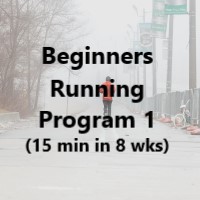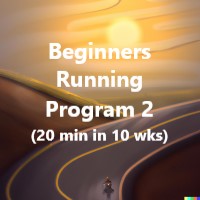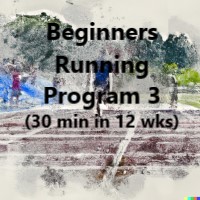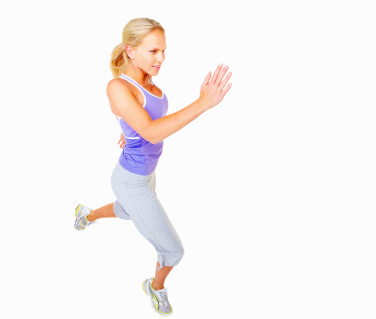Top Fifteen Beginner Jogging Myths
On this page I'll talk to you about the top fifteen beginner jogging myths.
When you are a beginning runner, it may all be a bit daunting at first.
And many of us have heard things about running that we thought were true, as non-runners.
But then we started running and found out it was all a load of horse... ehh bull... ehh, nonsense, that's what I was meant to say.
So, let's get right into it and dispel some of these beginner jogging myths!
Beginner Jogging Myth #1: You Can't Run
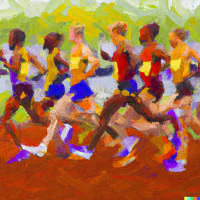
Truth is, that it does not matter what your current level of fitness is, what your age is or what you have or have not done in the past. We can all work on our fitness levels. We can all get fitter and healthier.
You can run, you just have to be willing to give it a try. When you are severely overweight, over forty or have been smoking, it is advisable to consult a doctor before you start with a full-blown exercise program. But there is no reason to believe that you can't run!
Beginner Jogging Myth #2: You Have to Run Fast
One of the mistakes you may make as a beginning runner, is that you feel you have to run as fast as possible to get results. It is probably running mistake no. 1.
It is simply not true. It is fine, even much better, to start off slowly, at a pace just faster than running.
Why better? Well, a few reasons:
a) Because you run less risks of getting injuries when you run slower.
b) Because going slower helps you build up your endurance by improving your cardiovascular system.
I asked fans of the Best Running Tips Facebook page what they felt were the biggest myths:


Beginner Jogging Myth #3: Running is Bad for Your Knees
According to the Facebook crowd the most common myth that people brought up was "running is bad for your knees".
This is simply not true. Did you know that running (or other exercise like swimming, cycling, etc) helps improve your bone density.



Beginner Jogging Myth #4: You are a Failure if You Stop for a Walk
When you start running, you will have some difficulties to get used to it.
How sad is it that many of us never start jogging or an exercise program, because they feel embarassed that they may not be able to run very far or they may have to stop to catch their breath!
When in fact, a great way to get into running is via a run/walk program which combines running and walking.
Check out the run/walk programs on this site:
Beginner Jogging Myth #5: You Have to Own the Latest Running Gear
When you start running, all you really need is some simple sports clothing. You don't need to spend hundreds of dollars, running is one of the most accessible sports on the planet. Anyone can do it, pretty much everywhere at any time!
Beginner Jogging Myth #6: You Have to Run Every Day
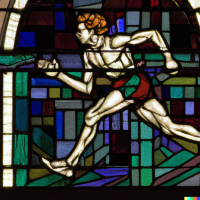
However, I would much prefer that if you exercise every day you combine your running with cross-training.
I have seen too many beginning runners get injured because they get too enthusiastic and do too much, too soon.
I have seen people get great results with running three or four times per week alone. I myself run four times per week and get some cross-training in as well.
So, don't go with some training program because it is there, or somebody else does it. Work out how you can fit in regular exercise in your life and go for a bit of variety.
Beginner Jogging Myth #7: You Have to Run at a Particular Time of Day
This myth is particularly popular amongst those of us wanting to lose weight. We can get so caught up in the latest study and beginner jogging tips about running and weight loss.
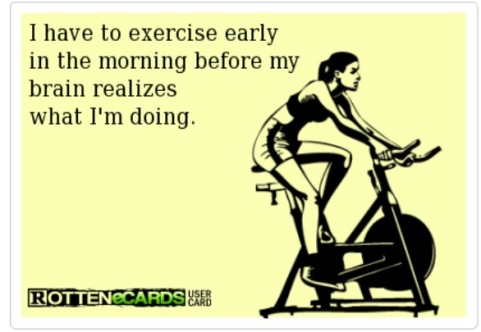
One day it is about running in the morning versus running at night.
The other day it is about running on an empty stomach or not.
Then about eating specific foods in combination with running.
Don't get caught up in the latest hype or bit of research. More important than all of that is that you actually get outside and run!
Also see the following page: Running for Weight Loss.
Beginner Jogging Myth #8: When You Run, Diet is Not Important Anymore
You may have started jogging because you want to lose weight. That's great!
However, what I see happen from time to time is that people take it easier on their eating / diet restrictions, just because they have started running.
Look, if you run 100 miles per week, you can eat anything and I am sure you will still be skinny.
But when you have just started running that's not going to be the case. The best results are obtained by combining both diet and exercise.
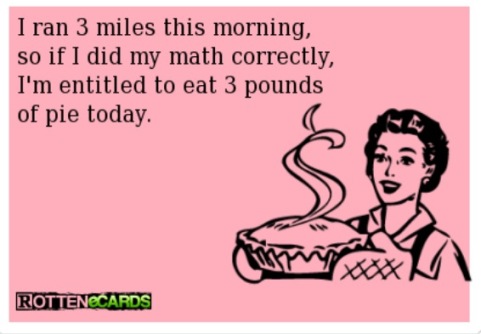
Beginner Jogging Myth #9: You Can't Join a Race Until You Are Superfit
You know what? Participating in a race is great fun. You may only just have started running. You may only just be able to run a block. Maybe less, maybe a bit more.
Why don't you set yourself a goal? E.g. do a 5k race three months from now. Or, if you are a bit fitter already, go for a 10k instead. You don't have to be fast to enjoy the fun and thrill of racing!
I have been in many running races with thousands and thousands of participants. There are often only three or five of them who think they'll have a shot at winning the race.
The others are there for other reasons. See if they can set a personal record. See if they can finish the race without having to stop for a walk. Wanting to get to the finish line. Having a race to work towards can provide tremendous motivation.
Give it a try!


Beginner Jogging Myth #10: Running on a Treadmill is Just the Same as Running Outside

Even advanced runners have a need to go quite slow on the treadmill initially just to get used to the feeling of treadmill running.
The other way around is often a rude awakening as well: suppose you are really comfortable with running five miles per hour on the treadmill.
You may find that when you run outside it is very challenging to stick to that pace. Running on the treadmill provides somewhat less resistance. In order to simulate outside running, it is best to run with your treadmill elevated at 1-2%.
Beginner Jogging Myth #11: You Have to Improve Every Workout
Many beginner joggers pick a set distance and then try to beat their time every single workout.
This does not work for several reasons. The first reason is, as per myth #2, it increases your risk of injuries.
The second reason is that this sets you up for failure.
Some days you simply feel better than ours. Some days it is warmer than others. You will not be able to improve every workout. As a result, you may get discouraged. Getting fitter and healthier is a process that just takes time.
Beginner Jogging Myth #12: You Need to Stretch Before a Run

Many of us get this wrong. We confuse warming up before a run with having to do stretches.
Now, warming up before a run is important. This means doing a gentle jog at the start of your workout. You leave the more strenuous work until your muscles are warmed up.
What does not help, and what can even be counter-productive is stretching before your run. Stretching cold muscles can cause sprains.
Also see my page with important running stretches.
Beginner Jogging Myth #13: It is Bad for Your Heart to do Long Runs

The chances of that happening are very unlikely. And if it were to happen, it wouldn't have been caused by running alone.
Only elite runners, people who have been logging hundred miles or more per week, every week for a decade or more can show signs of heart damage. As can serial marathoners who have been running multiple marathons per year for years and years and years.
So, if you are part of the 0.001% of the population that takes their running to the "insane" :) level, then yes, make sure you get your heart health checked out regularly.
For the rest of us... rest assured, exercise is great for your heart and cardiovascular system!
Beginner Jogging Myth #14: It is Running, Not Jogging

Just to irritate all those purists out there I refer to jogging myths on this page.
But please, let's not get carried away in semantics about what is jogging and what is running. Call it whatever you want. The most important thing is that you do it!
Beginner Jogging Myth #15: A Running Club is Not for Beginners
Many running clubs have different sections. Some for the more advanced runners, some for recreational runners and some for absolute beginners.
Don't assume that you can't join a running club because you can't run very far yet. Contact your local running club and see if they offer training and advice for your level of fitness!

And let's finish up with the first myth on this page:
Beginner Jogging Myth #1: You Can't Run
Yes, you can. It's so important that I decided to repeat it here.
Just see some of the stories here:



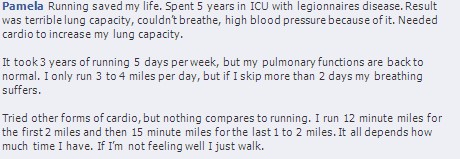
So what are you waiting for...?
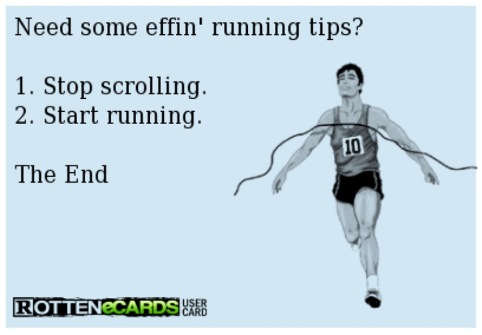
Alternatively, check out some of the pages below for more info... :)
Home > Beginner Running Tips > Beginner Jogging
What's New?
-
In the Army - Improving my 2 Mile Time
I am a 36 year old male who just joined the army. I have not run any long distance so I tried on my own to train and was doing ok but my times are still -
Marathon Diet - Improve Nutrition to do Better at the Marathon
I have got a question about my marathon diet. I have been an athlete all my life; mostly a runner, but cycle long distances sometimes. I am training -
Beginners Running Program 3 - Go from 0 to 30 Minutes of Running in 12 Weeks
The third beginners running program of Best Running Tips might be the best one. It is definitely the most popular. Get from couch to 30 minutes of solid running in only 12 weeks! -
Calories Burned Calculator - Calculate the Calories Burned While Running with This Calculator
This calories burned calculator calculates the calories burned while running, based on your weight and the distance you ran. -
Asthmatic Non-Runner With a Need to Run - 1.5 Miles in 13 Minutes
Truth be told I am NOT a runner. I can walk a 14 minute mile all day. But running, not me. I have had asthma since I was a child - severe through all -
Second Half Marathon in a Month - Should I Run It or Not?
Hi, I ran a half marathon a month ago, but have not done any great distances since, 6 miles max. I'm thinking of doing a half marathon this Sunday -
Running a 5k - Can I Be Faster at 30 Than I Was at 18?
I started running at 13 in high school. I ran cross-country, indoor and outdoor track. My track coach was very informed and my PRs were 800 - 2:22, -
Faster Minute Mile for 5K races
I'm 40 years old and I started to run consistently four months ego. My running pace went from 9 minutes miles to 7:30 minute miles in a 5k. Is it realistic -
I Need a Good Marathon Running Program
I am devastated. I ran my second marathon last weekend. I ran a marathon six months ago as well, but at about the 19-20 mile mark my legs cramped up... -
Is 20 to 30 Training Miles Enough to Run a Half Marathon
I have been a committed runner for a year and a half now and have completed two half marathons with over a dozen 10k races! I have been keeping running

